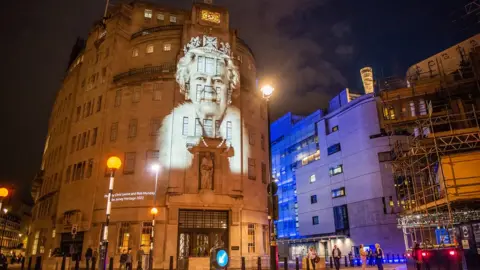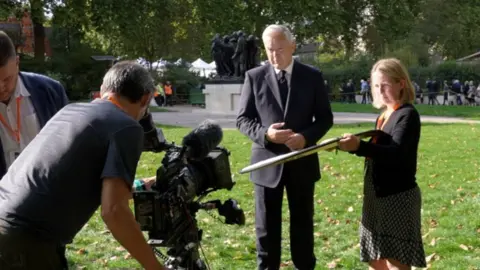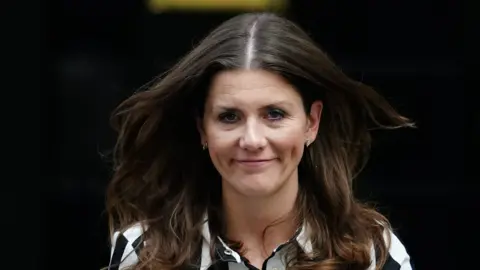No respite for BBC, despite praise for Queen's funeral coverage

 Robert Timothy
Robert TimothyThere was huge relief and pride at the top of the BBC this morning.
The board and senior executives knew the death of Her Majesty the Queen would be one of the biggest tests the corporation has faced in decades.
And they are very aware that, at the big moments in the life of the nation, the BBC needs to deliver events flawlessly, and better than rivals.
In recent years, the BBC has faced several big tests: the Covid pandemic, the Platinum Jubilee, the war in Ukraine, and now the death of the Queen.
In all those cases, even fierce critics in politics and the media - the people who often confuse what's said shortly after 08:10 on BBC Radio Four's Today programme with what the BBC means to people generally - have been moved to praise the corporation.
The BBC simply cannot afford to screw these big events up. Technically, they are an astonishing feat of engineering and planning. On Monday, every satellite truck seemed to work perfectly. The wifi routers worked. No live lines seemed to drop out. The camera shots, vision mixing, sound, directing and producing were rehearsed exhaustively and executed as intended.
 Bhasker Solanki
Bhasker SolankiThose 60 sound sources coming in to Bob Nettles, a BBC legend, were mixed so well that nobody had to give it a second thought.
It should be noted, of course, that other broadcasters did an outstanding job too.
Now back to reality
Tim Davie, the BBC director general, emailed staff on Tuesday, trying to strike a note of thanks that stopped short of triumphalism.
Nevertheless, praise from the culture secretary and others for the BBC's performance - even coming after similar plaudits over Ukraine, the Jubilee and Covid - will offer the BBC no respite from its two (related) existential challenges.
On Tuesday, Michelle Donelan, who recently took over from Nadine Dorries at the Department for Digital, Culture, Media and Sport, told Today that the BBC had done "a tremendous job" in recent days.
But she said she was "a sceptic" of the licence fee". In 2019, Ms Donelan said the fee was "an unfair tax and should be scrapped altogether".
 PA Media
PA MediaHer predecessor Nadine Dorries had announced in a tweet that "this licence fee settlement will be the last", while linking to a Mail on Sunday article in which her "friends" were quoted. Ms Dorries, who has now deleted her Twitter account, later rowed back from her comments.
In February 2020, The Sunday Times splash quoted a "senior source" in No 10 saying: "We are not bluffing on the licence fee. We are having a consultation and we will whack it."
It is true that Britain's economic challenges may briefly divert Downing Street's attention from reform of the licence fee, and indeed another big media policy, privatising Channel 4.
It is also true that in its near 100 years - the centenary falls on 18 October - the BBC has very often found itself in brutal conflict with government, generally because of BBC News, which is just one of its divisions.
Whether it was Winston Churchill during World War Two, Harold Wilson through much of his reign, Margaret Thatcher over Northern Ireland or Tony Blair over Iraq, the BBC has long mastered the art of infuriating the prime minister of the day.
But few former PMs wanted to scrap the licence fee.
The paradox of the BBC
Today, there is a paradox at the heart of the BBC.
On grounds of democracy, global influence, economic growth, even levelling up, it's possible to argue that in principle, the case for the BBC is strengthening.
And yet in practice, the licence fee is under immense, growing and possibly unsustainable strain.
Very briefly, those arguments in principle - with which many will vehemently disagree, especially those who object to the potential criminal sanction for those in breach of a court order to pay - are as follows.
Trusted news is vital in an age of polarisation. The BBC helps Britain to punch above its weight internationally. The creative industries were growing much faster than the rest of the economy before the pandemic: the BBC is fundamental to them. And with an expanding regional operation, the BBC is embedded in some local communities across Britain.
But... and it is a giant but, one worth £3.8bn last year... a universal fee, or tax, requires universal support.
From old people willing to pay, that support is dependent on love of programmes and a reputation for impartiality. From young people, it's the willingness to pay that's the problem.
In July, Ofcom reported that 16-24 year-olds in the UK spend an average of 53 minutes a day viewing traditional broadcast TV. That is down by two-thirds on just a decade ago.
Young people do like the BBC. Over nine out of 10 Britons aged 16-34 consumed BBC content in the days after the Queen died. There was an uptick in linear viewing too. Between Thursday 15 September and Sunday 18 September, 46% of 16-34 year-olds watched BBC TV.
How many pay for a licence fee, though? It is one thing to consume BBC content, especially on social media. But unless millions of young people decide to part with £159 a year, the licence fee will continue to split along generational lines.
In July, the latest report from TV Licensing suggested an enormous rise in the number of households refusing to pay the licence fee: 270,000. That may be partly explained by a reduction of visits to households because of Covid. But the cost-of-living crisis may exacerbate the underlying trend.
The BBC's coverage of the death of Her Majesty has won widespread acclaim. But acclaim is not hard cash. Until the BBC can convince young people to pay for it, while still convincing older audiences that it is impartial - the licence fee will get harder to defend in practice.
No amount of world-class coverage, state funerals or otherwise, will change that.
